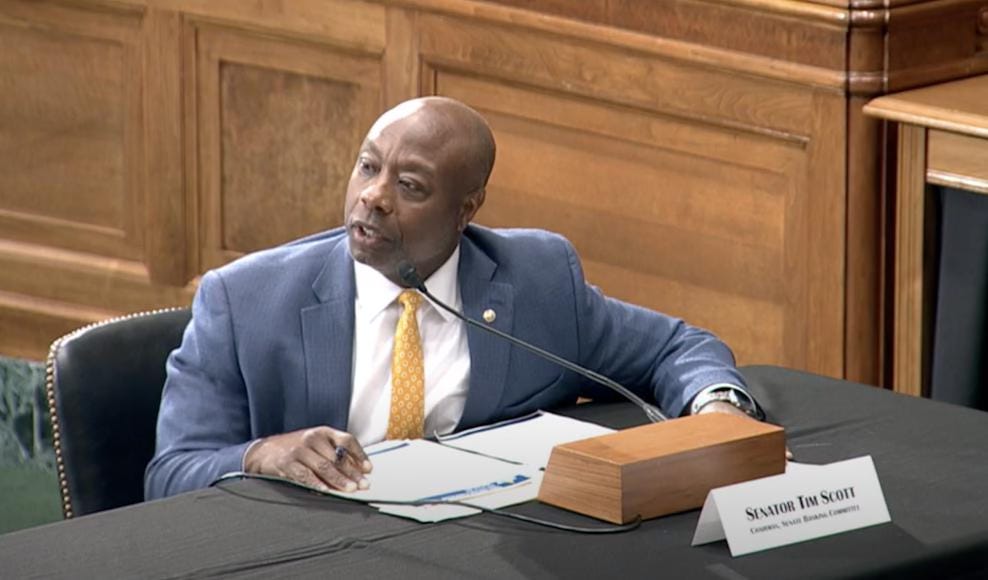Congress Resets Clock on Crypto Legislation Push
White House and Senate GOP aligned on separate paths for market structure and stablecoins
Welcome to the Friday edition of the Crypto In America newsletter!
What you’ll read: A new timeline for market structure legislation, and the top headlines from the week.
After days of uncertainty over how Congress will handle two critical crypto bills under President Trump’s original August recess deadline, Senate GOP leadership and the White House appear aligned on a new approach: passing market structure and stablecoin legislation as standalone bills, with a fresh timeline revealed at a Thursday press event.
Senate Banking Chair Tim Scott (R-SC) told White House crypto adviser Bo Hines, in a discussion alongside Senator Cynthia Lummis (R-WY), that he’s committed to a timeline aiming to complete market structure legislation by the end of September — a later deadline than President Trump, had initially pushed for.
Hines tweeted afterward: “We’re committed to getting market structure done by the end of September. Period.”
However, it remains uncertain whether the full Senate can pass the bill by then.
Scott, as the top Republican on the Senate Banking Committee, plans to hold hearings and a markup on the Senate’s version, but his influence is limited to his committee. Broader Senate action remains a question mark.
Adding complexity, the Senate Agriculture Committee — which oversees the CFTC — also holds jurisdiction but has remained relatively quiet on the market structure process so far.
Another key hurdle: securing enough Democratic support to move the bill through the upper chamber. Senator Lummis acknowledged the difficulty of getting stablecoin legislation passed on a bipartisan basis, likening the push to reach 60 votes to “giving dry birth to a porcupine.”
Scott echoed the difficulty, saying it’s important to be realistic about the numbers: “If you don’t have 60 votes, it doesn’t pass — so there’s work to do in this body.”
Driving home the new timeline, White House Crypto and AI Czar David Sacks laid out the expected sequence of events: introduction of the Senate’s market stricture bill before the August recess, with a markup in early September, and final passage by the end of the month.
Meanwhile, the House remains tight-lipped on when it will schedule a full vote on the GENIUS Act or whether any changes will be made — despite the White House’s urging not to “change a comma” in the text.
According to Sacks, the White House expects the bill to reach President Trump’s desk soon, with a signing ceremony anticipated next month.
Invest as you spend with the Gemini Credit Card®. Get approved to earn $200 in Bitcoin. Issued by WebBank. Terms apply.
Weekly Recap
ICYMI. Here are some of the biggest news stories this week from the intersection of Washington and Web3:
A New York district judge has denied Ripple and the SEC’s joint motion for an indicative ruling to scrap a permanent injunction and reduce a $125 million penalty, making clear that private deals don’t override public judgments. If they want out, she said, they can withdraw their appeals and let the judgment stand, or go through the appeals process to challenge it.
The House has passed the Deploying American Blockchains Act (H.R. 1664), a bipartisan bill aimed at boosting U.S. blockchain innovation. The legislation tasks the Department of Commerce with leading federal efforts, including coordinating public-private partnerships and streamlining regulatory guidance.
The Federal Reserve is dropping “reputational risk” as a factor in bank supervision, saying it will instead focus on clear financial risks. The move comes after criticism the term contributed to the debanking of crypto firms.
In a Tuesday hearing in front of the House Financial Services Committee, Federal Reserve Chairman Jerome Powell said banks are “free to provide banking services to crypto companies and are also free to conduct crypto activities.”
California Senator Adam Schiff introduced the COIN Act, targeting potential crypto conflicts among public officials.The bill would bar the president and First Family from using digital assets for financial gain while in office.
FHFA Director Bill Pulte has directed Fannie Mae and Freddie Mac to explore counting crypto as a reserve asset in mortgage applications. Only assets on U.S.-regulated exchanges would qualify, with safeguards for volatility.
The NYSE has filed to list a Trump Media ETF that would track Bitcoin and Ethereum. The proposed rule change, disclosed in an SEC filing Tuesday, marks the firm’s latest move into digital assets.
Senate Banking Committee Republicans have released crypto policy principles ahead of a new bill. Led by Senators Scott and Lummis, the plan would define crypto assets, shift oversight to the CFTC, and limit the SEC’s role.
Remember, new editions of the Crypto In America newsletter drop every Monday, Wednesday and Friday at 7AM EST.
If you like what you’re reading, don’t forget to subscribe!







Bills getting passed and signed into law... I'll believe it when it happens. Not before.
Other, non-legislative, actions are believable.